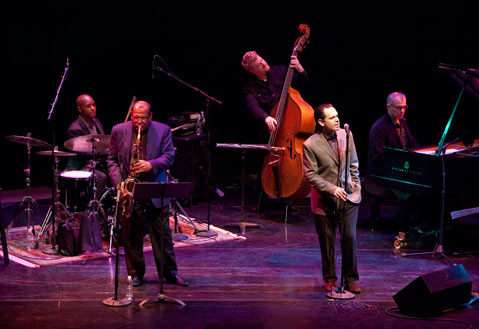Jazz Singer Kurt Elling Goes Pop Without Losing His Cool
On The Gate, Elling Excels

JAZZ’ VOICE, CONT.: Kurt Elling, the handsome and deeply talented singer, has taken his role as the generally acknowledged king of living jazz male vocalists proudly, and not lightly. He might have, by now, dipped into breezier pop turf in search of lucre and mall culture cred, but instead, he has taken on challenging and jazz-centric endeavors during his career. Given that dedication, observers may experience a “what’s this?” impulse hearing about Elling’s new album, The Gate (Concord), with a songlist including Joe Jackson’s “Stepping Out,” the Beatles’ “Norwegian Wood,” and Earth, Wind and Fire’s “After the Love Has Gone,” not to mention the fact that pop producer Don Was was behind the glass. Has Elling finally bit the bullet and leaned into the winds of pop sellout?
On closer inspection, the verdict is a resounding “hardly.” Instead, Elling has crafted one of the more intriguing examples yet of a bold “jazz” album which addresses and redresses aspects of pop music in a fresh and revitalizing way. It can be done, and he does it, brilliantly.
Who better—and when better—to catch Elling at the Lobero Theatre, as the de facto season-closer for the current “Jazz at the Lobero” series? Elling returns to this jewel of a jazz hall on Tuesday, April 19, following up his appearance here two years ago. Then, he was “playing the role” of another great jazz baritone, Johnny Hartman—to Ernie Watts’ John Coltrane—in a tribute to the famed Coltrane/Hartman collaboration album (can you say extra-lush “Lush Life?”). That history-lined homage project ended up being the album Dedicated to You, a Grammy-earner. But ironically, or not, Elling’s latest project, pop-coated thought it may seem on first impression, is more truly Elling-ian, and possibly his finest recording to date.
Out of the gate, on the theme of a cool old King Crimson tune, “Matte Kudasai,” Elling shines, with a glowing but never pompous sophistication, and with no small amount of help from his longtime pianist ally Laurence Hobgood. “Steppin’ Out” elevates and hip-ifies the wannabe cool Jackson original, and Elling’s “Norwegian Wood” is a fascinating study in the art of subtle, syncopated reinvention of a melody we all know and love. EWF’s sophisticated “After the Love Has Gone,” like another of The Gate’s tracks, Stevie Wonder’s “Golden Lady,” embodies the golden 1970s age when pop hits could have jazz elements in their veins, and Elling riffs on those songs accordingly, and in a highly personalized, acoustic way.
Elling also delivers a hypnotic take on the great and mystical Bill Evans ballad “Blue in Green” with an Al Jarreau lyric, and supplies his own literate lyrics for the old Marc Johnson tune “Samurai Hee Haw”—now called “Samurai Cowboy”—and a Don Grolnick tune for “Nighttown, Lady Bright,” a mini-epic closing the album, and fitted with a spoken-word snippet from Duke Ellington’s book Music is my Mistress. Rest assured, jazz is in the bones and in the house on this platter.
PARKER’S MOOD, PARTY CENTRAL: In terms of jazz cred and content, funk-making saxophonist Maceo Parker has been a go-to party planner figure for years. Under his own name, he shows up at jazz festivals and jazz-geared venues as a kind of soul-saucy relief and generally functioning as a “jazz act” for people who may not, in fact, like jazz. Parker, who famously brought his skillage to the bands led by James Brown and George Clinton of Parliament-Funkadelic, brings his party to Campbell Hall on Sunday, April 17 with his nine-piece band.
Parker’s latest album, Roots & Grooves (Heads Up) is a winner of a different ilk than most of his other recordings, bringing the saxist in collaborative contact with arranger Michael Abene and Germany’s WDR Big Band.
TONIGHT’S DANCE TICKET: Check out the China Philharmonic, with soloist Renaud Capuçon at the Granada, the penultimate show of another stellar, world-class CAMA orchestra concert season.



